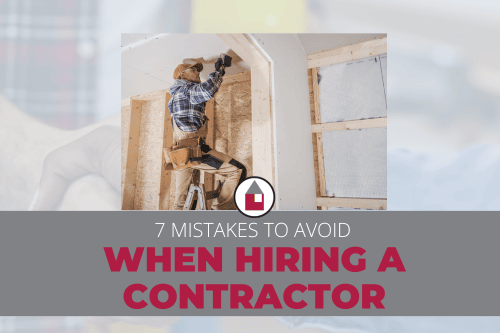
The holidays are a time for joy, family, and celebration, but they also bring added responsibilities. Between decorating, hosting, and just keeping up with your daily routines, your home can quickly start to feel more like a neverending to-do list rather than your haven.
That’s where smart home technology comes in. It can help you streamline holiday tasks to focus on what matters most—spending time with loved ones and enjoying the season’s magic.
And there are more upsides to upgrading your home tech: doing so can also enhance the overall value and appeal of your property. Current research indicates that 77% of today’s home buyers are interested in smart homes, which results in an up to 5% increase in a property’s resale value! In general, estimates indicate that sellers who invest in smart home technologies realize a 50% return.1
So whether you’re thinking about selling in the near future or just want to enjoy your home to the fullest this season, adding smart gadgets is an investment that pays off. Read on for some of the best smart home solutions to simplify your holidays (and just maybe make your home more marketable down the road, too).
ENTERTAINING MADE EASY
Spending time with friends and family is the highlight of the holiday season—but entertaining can be a lot of work. These tools can help turn any gathering into a celebration to remember without all of the fuss.
- Make Cooking Easier with Digital Recipe Access
Holiday cooking often means late nights and multiple trips to the store. Instead of juggling old recipe cards, let smart-home displays keep you organized with easy menu planning and grocery lists.
High-end: Google Nest Hub Max
This smart display offers an easy-to-use recipe mode with step-by-step guidance from the Google Assistant. It’s like having a sous chef right on your countertop.
Mid-range: LG – 27″ Smart webOS TV with Countertop Design
This smart TV can be perched on your kitchen counter or mounted on the wall to watch cooking shows, pull up your favorite recipes, or cast content from your mobile device.
Budget pick: Amazon Echo Show 8
With a Food Network integration and recipe assistance, this countertop model offers plenty of features in a less-expensive package.
- Set the Mood with Smart Lighting
The right ambiance can elevate any gathering. Control colors, brightness, and temperatures remotely with these smart lighting options.
High-end: Philips Hue Play HDMI Sync Box
Watching a holiday movie? Sync your smart lightbulbs to adapt their colors to what’s on the screen for the ultimate festive movie experience.
Mid-range: Lutron Caseta Wireless Bridge
Use this small internet-controlled device to set up automations for your smart bulbs, so you can dim all your lights at once with a swipe on your smartphone.
Budget-friendly: Govee Lightbulbs
Just getting started with smart bulbs? This affordable option allows you to control color and brightness using your Alexa or Google Home device.
- Amplify Your Holiday Spirit with Smart Speakers
From carols to party playlists, music sets the tone for the holidays. These smart speakers will get everyone in the mood to sing along.
High-end: Bose Smart Speaker 500
This powerful speaker delivers room-filling sound—and Google Assistant and Alexa are both built-in.
Mid-range: Amazon Echo Studio
The best device for Amazon loyalists who care about sound, music comes through loud and clear on this speaker.
Budget-friendly: Google Nest Mini
This diminutive speaker gives you voice-controlled playback at an entry-level price.
TRADITIONS WITH A TWIST
Decorating your home and popping on a holiday film gets everyone in the holiday spirit. These tech solutions make things easier and give you more time to enjoy the fun.
- Watch Holiday Favorites in Style
Level up your holiday movie traditions with smart projectors that turn any room in your home—or even your backyard—into a movie theater.
High-end: Epson Home Cinema LS1100
This 4K projector is a serious investment, but it delivers cinema-quality performance and a laser light source that won’t require replacement bulbs. It’s also easy to set up and adjust.
Mid-range: Samsung Freestyle 2nd Gen Smart Portable Projector
Use this feature-packed, battery-powered projector nearly anywhere—it’s designed to level and focus your video automatically and to scale to the size of your space.
Budget-friendly: Vankyo Performance V700W
This 1080p projector offers a bright picture, high-quality audio, and the portability to move it from room to room (plus outside). You can cast from your mobile device or plug in a computer or USB.
- Shine Bright with Smart Plugs
Tired of clambering behind furniture to get to a hard-to-reach plug for your decorations? Invest in smart plugs, and you can control all of your electrified holiday decor (plus anything else you might plug in!) easily from your phone.
High-end: Meross Smart Power Strip
This smart power strip includes four AC outlets plus two USB C and one USB A port. It’s compatible with Apple HomeKit, Amazon Alexa, and Google Home, and each outlet can be operated individually.
Mid-range: Enbrighten Wifi Smart 2-Outlet Plug
This smart plug turns one wall outlet into two smart outlets. Control the plug using an app or with Google or Alexa voice assistants.
Budget-friendly: Kasa Smart Plug Ultra Mini
These inexpensive plugs are designed to take up minimal wall space yet offer plenty of features. Plus, they’re compatible with Google and Amazon home ecosystems.
- Create a Winter Wonderland with Smart Outdoor Lighting
Whether you want to wow the neighborhood with an eye-catching display or simply add a touch of outdoor holiday charm, setting up lights doesn’t have to be a daunting task. Smart outdoor lighting makes it simple to illuminate your home’s exterior with minimal effort or planning.
High-end: Govee Permanent Outdoor Lights
Install these permanent outdoor lights on your home and celebrate year-round with app-controlled color and effects options for every holiday you can think of.
Mid-range: Twinkly Icicle Lights
Drape your home in any color you can think of with these easy-to-use, app-controlled icicle-style lights. True to the name, there are plenty of twinkling options to choose from!
Budget-friendly: Brizled Smart Christmas Lights
String up these indoor-outdoor lights wherever you’d like to enjoy customizable colors and effects, or sync the bulbs with music for a truly eye-catching outdoor display.
SIMPLIFIED HOME MANAGEMENT
There’s plenty to manage at the holidays as it is—make things easier for yourself by automating some basic home tasks and functions. Less time spent on tedious chores means more time making memories with your family.
- Keep Your Home Spotless with Robot Vacuums
The holidays can create a lot of mess — stay on top of it with smart vacuums that clean up all of those cookie crumbs and bits of wrapping paper for you.
High-end: Roomba Combo J9 Plus
Say goodbye to vacuuming and mopping with this high-tech robot, which comes complete with AI obstacle avoidance to keep it from banging into your furniture.
Mid-range: Roborock Q5 Max+
This powerful robot vacuum is highly customizable—use the app to set up cleaning preferences like a second pass through high-traffic rooms or to block off areas you’d like left alone. Plus, it empties its own bin!
Budget-friendly: Shark Ion
This robot vacuum may not come with all the bells and whistles, but it does a great job keeping dirt and pet hair off the floor. You can control it with Amazon Alexa or the Google Assistant in addition to a dedicated app.
- Manage Deliveries and Greet Guests with Smart Doorbells
The holidays tend to bring a lot more people than usual to your door. Keep track of who’s coming and going, and keep your home safe with smart video doorbells.
High-end: Eufy Dual+ Security Video Doorbell
This large video doorbell offers a much wider field of view than most competitors, plus high resolution and night vision. It’s compatible with both Amazon Alexa and Google Home devices and can be set up wired or wireless.
Mid-range: Google Nest Doorbell Camera
This sleek doorbell camera is easy to set up and control from a distance and offers fast notifications and the ability to respond by voice or with preset messages. Advanced features include package detection and facial recognition.
Budget-friendly: Arlo Video Doorbell
This doorbell offers a wide field of view, high-resolution images, and the ability to zoom in, and is compatible with multiple smart-device ecosystems. However, some of its features, like recordings, require a monthly subscription.
- Protect Your Home While You Travel
Unfortunately, the holidays tend to bring higher rates of home break-ins. Whether you’re traveling or staying local, these tech solutions can help keep your home and family safe.
High-end: Ring Alarm Pro
Ring is well-known for video doorbells, but they also offer full home security systems, complete with professional monitoring (for a monthly fee). With high-performing devices and a built-in router to ensure working wifi, this system lets you keep an eye on things no matter where you are.
Mid-range: Abode Smart Security Kit
This kit is designed to work with all of the major smart home ecosystems, allowing you to connect as many devices as you’d like for a seamless experience. It includes a hub device, a door/window sensor, and a motion sensor, and you can easily add on from there to customize a system to your needs.
Budget-friendly: August WiFi Smart Lock
Lots of visitors coming and going this holiday season? This smart lock upgrades your existing deadbolt, allowing you to give access to trusted family and friends. Best of all, it attaches to the lock on the inside of your door, so it won’t impact your curb appeal or draw unwanted attention.
ENJOY A BETTER HOLIDAY SEASON WITH SMART HOME TECH
Incorporating smart home technology can help make this holiday season more relaxing—and it can also be a great investment that adds value to your property in the long run. From energy-efficient lighting to reassuring security systems, these gadgets do more than just make life easier; they enhance your home’s appeal to future buyers.
If you’re curious about how upgrading your home’s tech might impact its value, we’d love to help. Reach out for a free consultation to learn more about the latest trends in smart home technology and how it can align with your real estate goals. Whether you’re looking to sell soon or simply upgrade your lifestyle, we’re here to guide you every step of the way.
Sources
- National Association of Realtors – https://www.nar.realtor/blogs/emerging-technology/smart-homes-can-help-you-grow-your-business-heres-how

 How to Find a Home That Fits Your Whole Family
How to Find a Home That Fits Your Whole Family Stage to Sell: 7 Proven Steps to Attract Buyers and Boost Offers
Stage to Sell: 7 Proven Steps to Attract Buyers and Boost Offers A recent survey found that more than half (52%) of American homeowners have a renovation project planned this year.1 If you’re among them, you know that embarking on home improvements can be both exciting and daunting. Read on for the 7 mistakes to avoid when hiring a contractor.
A recent survey found that more than half (52%) of American homeowners have a renovation project planned this year.1 If you’re among them, you know that embarking on home improvements can be both exciting and daunting. Read on for the 7 mistakes to avoid when hiring a contractor. With home prices and rates still relatively high, securing a mortgage can feel daunting––even to the most experienced borrowers. But don’t let that deter you: Read on for the top 4 factors to consider when choosing your mortgage. If other homebuyers’ experiences are any indication, odds are you’ll eventually find a home loan that works well for you.
With home prices and rates still relatively high, securing a mortgage can feel daunting––even to the most experienced borrowers. But don’t let that deter you: Read on for the top 4 factors to consider when choosing your mortgage. If other homebuyers’ experiences are any indication, odds are you’ll eventually find a home loan that works well for you.